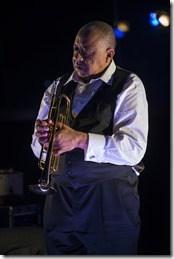
Satchmo at the Waldorf
Written by Terry Teachout
Court Theatre, 5535 S. Ellis (map)
thru Feb 7 | tix: $45-$65 | more info
Check for half-price tickets
Powerful, bittersweet retelling of jazz legend’s last days
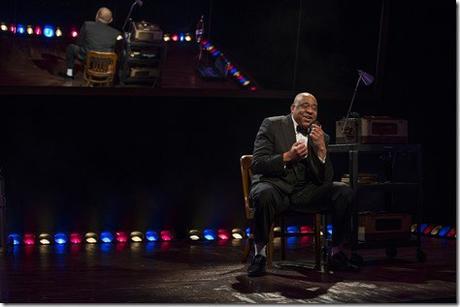
Court Theatre presents
Satchmo at the Waldorf
Review by Lawrence Bommer
Surrounded with footlights, the elevated Court stage is spare, a place for soliloquy. We see–and feel—Louis Armstrong, America’s trumpet troubadour, at 71, four months from death. Beloved and alone, the jazz genius is incontinent, astonished at having grown old, sucking on an oxygen tank in his dressing room in the Waldorf Astoria Hotel. He’s preparing to do what still comes naturally—to make folks happy. The Empire Room will be the final venue for “Satchmo” (so called because his wide mouth resembled an open satchel), who looks back on over half a century of jumping jazz played by a horn from heaven.
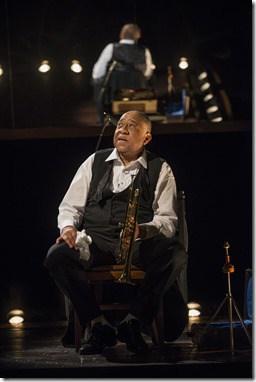
Equipped with a “sawmill” solo style and the power to make a trumpet testify to anything he wants, “Pops” may proclaim “It’s A Wonderful Life,” but his own brought constant conflict. It saw a struggle of fame against racism and ridicule, contending with whites who only liked him as the affable crooner of “Hello, Dolly” (a hit he hated), a clown in real blackface, and African-American artists like Davis, who reviled him as Jim Crow’s Uncle Tom. But for Armstrong all that mattered was the music—not even the money. “Singing and swinging”— feeling joy and sharing it big time—that was his passionate persuasion.
Listening like Beckett’s Krapp to tapes of past triumphs, Henley’s gravel-voiced balladeer recalls his rough-and-tumble origins in New Orleans’ Storyville redlight district, his salad days in Chicago trying not to become a musical jester to Al Capone and "Dutch" Schultz, his attempts to escape the modern plantation of the white-run record industry, his four very different wives, and the magic horn “that always came first.” No one to delete expletives (and we hear many, racial as well as scatological), Satchmo could roundly curse President Eisenhower and Governor Faubus for defying desegregation. But anger didn’t suit his style: The mellow music that melted audiences was his inevitable gift to the grateful.
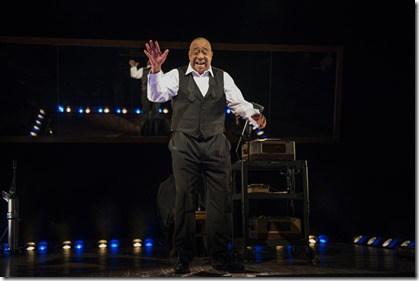
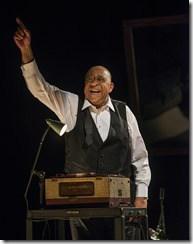
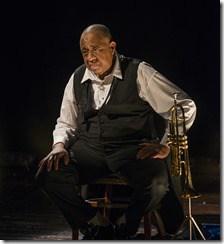
There was a price to the pleasure. Henley also plays Glaser, Armstrong’s Jewish agent for 40 years, a pitbull of a protector who made him both son and victim. Suddenly (and convincingly) switching from Louis’ cool confidence to Glaser’s driven, often nasty, public-relations predation, Henley reveals a canny promoter who shaped Armstrong’s style—and ultimately betrayed him. But, like everything here, Glaser’s treachery is a complicated crime, begot by blackmail as much as it enshrined ingratitude.
Of course, Louis Armstrong’s silky-smooth, industrial-strength charm was a spell he cast at a cost. Newell’s master touch and Teachout’s contagious compassion bring out in Henley the rough edges and unseen undertows of a complex career. It took, it seems, a greedster like Glaser to deliver Louis’ lovely legacy. Joe didn’t make him what he was but, no question, the grasper gave him glory. One more deal with the devil—that’s showbiz in America for better and worse.
Rating: ★★★★
Satchmo at the Waldorf continues through February 7th at Court Theatre, 5535 S. Ellis (map), with performances Wednesdays and Thursdays at 7:30pm, Fridays 8pm, Saturdays 3pm and 8pm, Sundays 2:30pm and 7:30pm. Tickets are $45-$65, and are available by phone (773-753-4472) or online through their website (check for half-price tickets at Goldstar.com). More information at CourtTheatre.org. (Running time: 90 minutes without intermission)
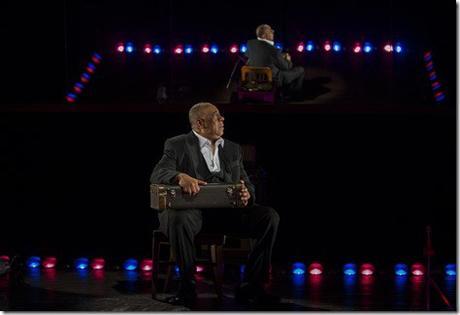
Photos by Michael Brosilow
artists
cast
Barry Shabaka Henley (Louis Armstrong, Joe Glazer, Miles Davis)
behind the scenes
Charles Newell (director), John Culbert (set design), Nan Cibula-Jenkins (costume design), Keith Parham (lighting design), Andre Pluess (sound design), Amanda Weener-Frederick (production stage manager), Michael Brosilow (photos)
Barry Shabaka Henley talks “Satchmo” – Part 1
Barry Shabaka Henley talks “Satchmo” – Part 2
Barry Shabaka Henley talks “Satchmo” – Part 3
16-0123

